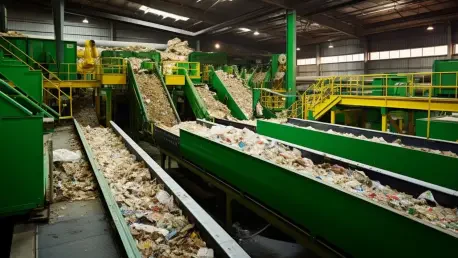The streets of Massachusetts are brimming with discarded items—paint cans, old mattresses, and used lithium-ion batteries. As these items pile up, the state’s waste management system is under unprecedented stress. Could the newly formed Massachusetts Extended Producer Responsibility (EPR) Commission be the answer to this mounting crisis?
Setting the Stage for Change
In an attempt to confront the waste problem head-on, the Massachusetts Extended Producer Responsibility (EPR) Commission was established. The commission, spearheaded by the state’s Department of Environmental Protection (MassDEP), has set a critical timeline, with initial recommendations due before the state legislature by January 15, 2026. They have expedited discussions on specific categories to provide actionable legislative recommendations over the summer, setting the stage for long-term change.
The commission’s primary goals include formulating policies that oblige producers to take responsibility for the disposal of their products. This move aims to significantly reduce the waste volume and related costs, which have been escalating at an alarming rate.
Growing Waste Management Crisis
Massachusetts faces a surging waste crisis, with volumes spiking to nearly 6.2 million tons in 2023. This rate places the state significantly off-track for its 2030 waste reduction goals. Limited disposal capacity and ever-increasing costs further exacerbate the problem. From 2021 to 2024, the state witnessed an 18% increase in solid waste disposal and recycling expenses, highlighting the urgency for immediate intervention.
These staggering figures underscore the critical need for efficient and innovative waste management solutions. The ramifications of inaction extend beyond financial strains to environmental and public health concerns, necessitating prompt and effective measures.
Priority Categories: Paint, Mattresses, and Lithium-ion Batteries
The commission has decided to initially focus on three categories: paint, mattresses, and lithium-ion batteries. These were chosen due to their relative simplicity and immediate impact potential. Notably, Massachusetts already bans mattress disposal, a unique factor influencing these discussions.
Looking at successful EPR models in other states can provide valuable insights for Massachusetts. States like California and Vermont have implemented effective EPR programs for similar products, paving the way for Massachusetts to adopt and adapt these proven strategies.
Packaging and Electronics: A Complex Future Discussion
Packaging and electronics are notably more complex categories and have been reserved for later discussions. These items pose significant challenges due to the diversity of materials involved and the intricate processing and recycling infrastructures required. While five states have enacted packaging EPR laws, Massachusetts has yet to gain significant traction in this domain.
Legislative preferences in Massachusetts lean toward addressing these issues through broader, omnibus bills rather than piecemeal approaches. This method, while thorough, often slows legislative progress, demanding strategic planning to ensure timely action.
Expert Opinions and Legislative Perspectives
Scott Cassel, CEO of the Product Stewardship Institute, emphasizes EPR as “the centerpiece of the circular economy,” noting its potential to revitalize stagnant municipal recycling rates. Massachusetts legislators, environmental organizations, and representatives from the National Waste & Recycling Association (NWRA) have actively contributed to the commission’s discussions, aiming to shape effective policies.
The inaugural meeting set the tone for future deliberations, highlighting the importance of collaborative efforts among various stakeholders. These discussions are expected to significantly influence the state’s waste management policies, paving the way for systematic and sustainable waste reduction.
Strategic Actions and Recommendations
Moving forward, Massachusetts must leverage successful frameworks from other states to develop robust EPR policies. By focusing on comprehensive strategies and engaging industries and communities, the state can build broad-based support for these initiatives.
Engaging stakeholders at every level is crucial for the successful implementation of EPR policies. Collaborative efforts will ensure that all voices are heard and that the policies formulated are pragmatic, effective, and inclusive.
With the clock ticking toward the 2026 deadline, Massachusetts has an opportunity to set a precedent in progressive waste management. The work of the EPR Commission promises to transform the state’s approach to waste, reflecting a commitment to environmental stewardship and sustainable living.
In retrospect, Massachusetts’ journey with the EPR Commission has heralded a promising start toward addressing pressing waste management issues. The commission’s strategic focus on paint, mattresses, and batteries has set a solid foundation for future endeavors, with upcoming discussions on packaging and electronics poised to further shape the state’s environmental policies. The collaborative approach and expert inputs have been instrumental in crafting a forward-thinking waste management strategy, leaving Massachusetts well-positioned for a sustainable future.









